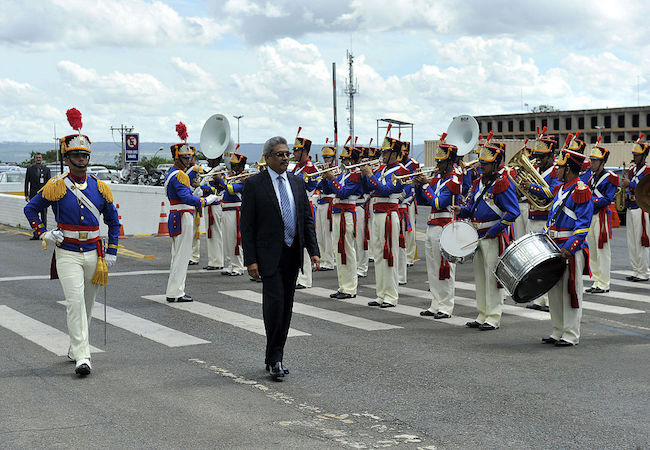
By Bahauddin Foizee
Sri Lanka and its ports are strategically important to major regional and global economic powers, as they lie along one of world’s busiest and most important sea lines of communication (SLoC). This is why major powers, including China, always crave for establishing their economic and military presence in this strategically important island.
Sri Lanka’s tilt towards China under Mahinda
When Mahinda Rajapaksa became the Sri Lankan president in 2005, he took this strategically important island nation closer to China. During Mahinda’s two terms of presidency from 2005 to 2015, he had given China the opportunity to engage heavily in his country’s economy and defense, enabling China to establish too much influence to ignore it.
Chinese investment in Sri Lanka now amounts to an estimated US$11 billion, including US$8 billion in the form of loans related to Belt and Road Initiative (BRI). Chinese company has built a giant seaport in Sri Lanka. Another Chinese company is constructing a US$1.4 billion worth port city near Colombo. Chinese firms plan to construct power stations and expressways as well.
According to The Diplomat, after investing heavily in the island nation’s southern areas, China is expanding its engagement in Sri Lanka’s northern areas, where China has started to invest in rubber, tea and coconut plantations.
Furthermore, the two sides have been discussing Chinese investment of worth US$30-40 million in Sri Lanka’s plantation sector. If this goes well for China, it may pour even further investment in this sector.
Why did Sirisena fail to reduce Chinese influence?
After the defeat of Mahinda Rajapaksa in the 2015 presidential elections, the subsequent Sri Lankan president, Maithripala Sirisena, temporarily attempted to reduce China’s influence in his country.
Sirisena had re-established relations with India and the U.S., and promised to be more respectful towards human rights and democracy.
Initially, Sirisena suspended all Chinese investment projects, citing allegations of corruption and overpricing. A year later, Sirisena eventually allowed the resumption of Chinese projects, with demands for changing some terms of the projects.
Despite his attempts to reduce Chinese influence during the initial stage of his tenure, Sirisena had later realized that China has already established way deeper influence in his country and he perhaps felt that it would be unwise to ignore this reality. Hence, he ran out of option and had to resume Chinese projects.
Furthermore, he found that the investments Sri Lanka needed could only be made by China with the courtesy of China’s burgeoning economic muscle. Sirisena perhaps also couldn’t ignore the fact that Chinese firms have been employing thousands of local workers — something which Sirisena needed for creation of employment.
Of course the fact that Chinese investment attaches no strings – including no condition for ensuring human rights – played a part to this end.
Sri Lanka, under Sirisena, had to even handover a deep seaport in Hambantota to Chinese control for 99 years because of the island nation’s inability to pay off Chinese debts. According to Report Syndication, the lease have led to the accusation that China was practicing Debt trap diplomacy.
The feud between Sirisena and Ranil Wickremesinghe was another factor that made Sirisena softer towards China. Sirisena fired Prime Minister Ranil Wickremesinghe in October 2018 and appointed former President Mahinda Rajapaksa to the post. Although the court later reinstated Wickremesinghe, this clearly made Sirisena tilt toward China against Wickremesinghe, who got India’s support during the feud between the two Sri Lankan politicians.
Therefore, although pro-China president Mahinda Rajakpaksha was defeated in 2015 presidential election by Maithripala Sirisena who promised to turn Sri Lanka’s pro-China policy into a balanced one, Sirisena failed to deliver on this promise despite his initial attempts to fulfill it. Hence, Chinese influence and engagement in Sri Lanka continued even during Sirisena’s tenure.
Now that Gotabaya Rajapaksa – Mahinda Rajapaksa’s younger brother and the defense secretary during Mahinda’s tenure – became the president after winning the last November’s presidential election and that Mahinda himself has sworn in as the new prime minister, there is the likelihood that the Rajapaksa brothers will push Sri Lanka further into China’s lap.
This article was originally published on Oped Column Syndication.
Bahauddin Foizee is a threat/risk intelligence analyst focusing on the assessment of investment, legal, security, political and geopolitical threat/risk. He also collaborates with other analysts who regularly assess social, environmental, financial and military threat/risk. He has been published on Asia Times, The Diplomat, The National Interest, and Institute of Peace and Conflict Studies, among others.




